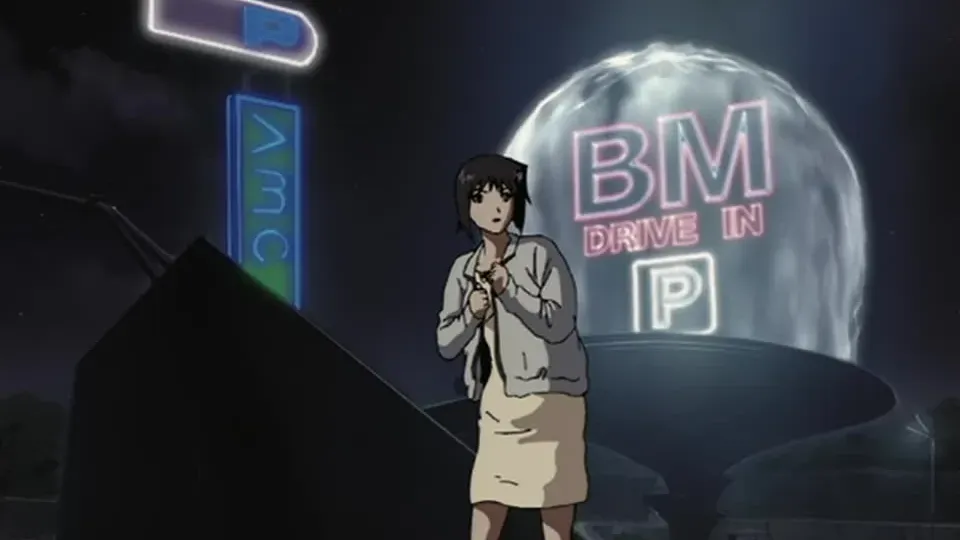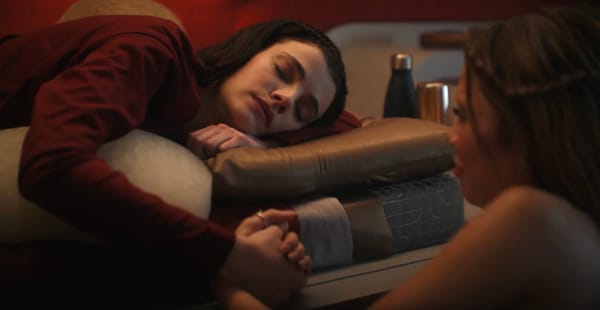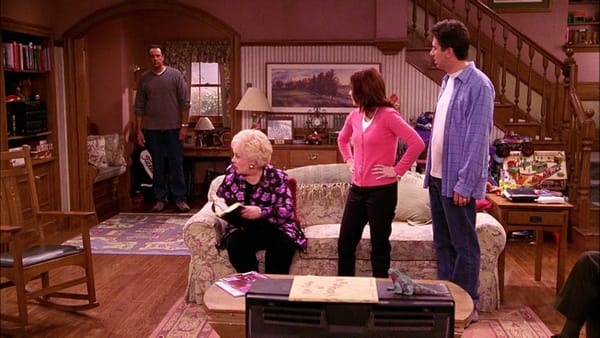Cowboy Bebop: "My Funny Valentine" and "Black Dog Serenade"
In which a story depends on how you tell it

(This is the eighth installment of my biweekly recaps of Cowboy Bebop, the TV Tokyo animated series that ran from 1998 to 1999 to cult fascination and critical acclaim. I’ve never seen it! These recaps are only available to paid subscribers.)
- “My Funny Valentine” (originally aired June 12, 1998 [TV Tokyo], February 6, 1999 [Wowow], and October 22, 2001 [Adult Swim])
- “Black Dog Serenade” (originally aired February 13, 1999 [Wowow] and October 22, 2001 [Adult Swim])

Both "My Funny Valentine" and "Black Dog Serenade" are "tragic backstory" episodes. By the end of the first, we know about as much as Faye does about her origins. We know essentially everything Jet does about what happened to his arm by the end of the second. The two episodes are structured very similarly, too. In both, the characters are invited to re-examine their pasts, only to learn that they were gravely misled about what happened to them. The final twists are despairing and even depressing. Neither Faye nor Jet has solid ground to stand on outside of the Bebop. They have been let down by everyone they knew. (Also uniting these episodes: Spike is an important presence in both, but if you watched either episode, you would never guess he is the show's protagonist.)
"Horrible pasts unite these characters" is a pretty standard setup for a sci-fi show centered on the family that develops among the people who work on a spaceship. We've gotten a very big dollop of Spike trauma across this season so far, so it's not like Faye and Jet are our first glimpses at this theme. (Indeed, this is the second "Jet has a pretty dark past" episode of the run so far.) But if these horrible backstories aren't doled out sparingly, these shows can feel punishing, as the weight of those horrors starts to pile up.
Genre shows so often walk a tricky line between audience escapism and the emotional reality of their characters. Tilting too far in either direction can imbalance the show, but the balance is also different for every show. I wouldn't want Game of Thrones to have the same balance as, say, Star Trek: The Next Generation. Figuring out that balance is a thing every TV show has to handle, but it can be particularly important (and tricky) in these genre series, simply because of how many people watch them to escape this world in favor of one that might not be better but will definitely be different.
So when I watched these two extremely similar episodes in a row, I normally might have bounced off the second, finding it too much grimness in rapid succession on a show that thus far has been very good at varying the tones of its stories. And when you consider that "My Funny Valentine" is my favorite episode of the show so far (more on this in a second), that should have put "Black Dog Serenade" in even more of a hole.
Instead, I really enjoyed both of these episodes, and I didn't realize how similar they were until I sat down and thought critically about them. Breaking down the stories of these episodes makes them sound like variations on a theme; the experience of watching them would never lead you to think about their underlying similarities.
The smartest call these two episodes make is rooting their tragedies in the very specific characters of Faye and Jet, then calibrating their storytelling choices accordingly. "My Funny Valentine" isn't quite... Lynchian, but it's much weirder and more driven by paranoia than the show typically is. It feels a little like Twin Peaks, or at least as much as Bebop is capable of feeling like Twin Peaks. "Black Dog Serenade," on the other hand, has the feel of a '70s conspiracy thriller, and its hand-to-hand combat and action sequences have a brutal quality that echoes the close quarters in which those sequences are staged.
Indeed, the use of space is key to creating the difference between these two episodes. Faye is a character imprisoned by the uncaring nature of the universe she finds herself in, so "My Funny Valentine" is filled with sequences that underline just how small she is in the face of everything she's facing. Even when the episode drops into action, it's slightly more detached than the show usually is. She is the victim of a society that doesn't give a shit about someone like her, and the conspiracy that destroys her is impersonal. It's the sort of vague, bureaucratic violence we're all too familiar with in our world, one where somebody's heart-wrenching, horrible story is turned into just another statistic.
In contrast, "Black Dog Serenade" is about a very personal conspiracy. The plot that nearly kills Jet in the past and results in losing his arm is driven by a fundamental betrayal by someone Jet thought he could trust. When the episode bursts into violence, it's the most brutal violence the show has seen yet, and it's all staged so that the blood flies right into the camera. The system didn't hurt Jet. People hurt Jet. When the episode turns bloody, it underlines just how gutting the revelation of his former partner's betrayal is.

As much as I loved "Black Dog Serenade," I need to devote the rest of this recap to "My Funny Valentine," which cleared an incredibly high bar for me. From the first, Faye's very strange character work, where she seems like she's simultaneously 15 and 55, has alternately amused and irritated me. She seemed like an attractive woman as written by a writing team of guys. And maybe because the Bebop team contained women, the show seemed curiously aware that it was writing her as a kind of straight guy fantasy, which made me think some other shoe was going to drop. And boy, did it drop.
"My Funny Valentine" never quite gives you solid ground to stand on. What we know is that Faye doesn't know anything about her past and that she woke up at 20 after decades in cryogenic slumber. Yet the second she awoke, she was saddled with massive amounts of debt, given several mysteries to solve about herself, and preyed upon by a con man who pretends to love her. To say that this episode resonated with me as a trans woman who has a tragic backstory of her own would be... an understatement.
By the end of "My Funny Valentine," not only don't we know the truth about Faye, but we don't know if the handful of truths she was clinging to were real either. Matsumoto was a con man, and the doctors who awoke her might have been as well. She definitely got out of cryogenic slumber unless something else is going on. Was she really injured at the age of 20, or did somebody just tell her that? She is a woman without a past, except she's been saddled with so much debt from her non-existent past that she now doesn't have a future. Finding herself onboard the Bebop, then, is maybe the one good thing in her entire, miserable life.
I tend to resist when shows that have a male and female lead who are both single and seem like they might be good together angle those characters so that I can feel the series trying to get me to ship them. But I love the way Bebop has turned Faye into exactly the kind of character who could potentially be good for Spike. Where Spike has an operatic past that borders on the epic, Faye has a series of blanks to be filled in later. What's more, the show hasn't pushed the two as potential romantic partners all that hard outside of a scene or two. Thus, it's easier to see how they might be able to support each other through very different but not dissimilar traumas.
Most of all, however, I love how "My Funny Valentine" underlines Faye's experiences as rich metaphors for what it means to be a young woman in the world without a safety net. She doesn't have a family or friends to fall back on, and the debt is always coming due. If she didn't have the Bebop, what would she have? But she keeps trying to break up with the Bebop team before they can break up with her. Faye fundamentally doesn't believe somebody will be there for her in the morning if she goes to sleep beside them at night. She isn't flighty; she's beating her wings against every cage she thinks she's found. I assume the show will eventually fill in the various blanks of Faye's past, but I almost hope it doesn't. The mystery is more satisfying than any answers the show could offer (though I'm willing to be proved wrong).
When I said this episode had an incredibly high bar to clear, that's what I meant. It needs to make sense of a character whose most salient qualities all mean that she needs to be just a little elusive. And it needs to make sense of her in a way that never quite pins her down. "My Funny Valentine" does this in a manner you likely won't be surprised by — it deepens the mystery surrounding Faye Valentine — but with an emotional effect that I didn't see coming. To be the center of a mystery is exhausting, especially when no answers seem likely to arrive. "My Funny Valentine" accomplishes the difficult task of getting viewers to want answers less for ourselves and more for the woman who might find solace in them. It simultaneously makes sense of the show's most potentially confounding character. It's pretty brilliant, all told, and I adore it.

Other thoughts I thought:
- Spike telling Faye that her story was fine but needed editing is... super relatable. Maybe that's why I like Faye so much...
- This isn't a weakness of the show, precisely, but I think it's fascinating how if Ed isn't vital to the main story of the episode, the series can never quite figure out what to do with her and tends to just settle on "I guess she's being a little annoying." There's nothing wrong with that, but when the other characters are so textured, it leaves a bit to be desired.
- Ein, on the other hand, is a rich, detailed character who stands with the finest characters from Shakespeare, the Greeks, Dickens... a masterpiece!
- "Even Buddha gets upset after three times!" — Faye Valentine, on how Buddha might feel if the shower kept breaking down.
- Something about "Black Dog Serenade" reminded me of Alien. I think it was the use of action staged in tight corridors and the vaguely grimy aesthetic. Or it could just be that the use of a space prison reminded me of Alien3.
- The final moment of "Black Dog Serenade," with Jet lighting a cigarette for his former partner after firing the bullet that has consigned said partner to death, is a nicely dark, noir-influenced storytelling turn. I also loved how it didn't bother suggesting the guy got more than one drag — and not even that.
- I don't know what it was about these two episodes, but they've gotten the closing credits song stuck in my head for the past 24 hours. It's a good song! I don't know why it didn't stick with me before!
Next time: We're not quite in the home stretch, but we're getting close, as we zero in on what exactly a "Mushroom Samba" is, then decide to "Speak Like a Child." See you May 23!




